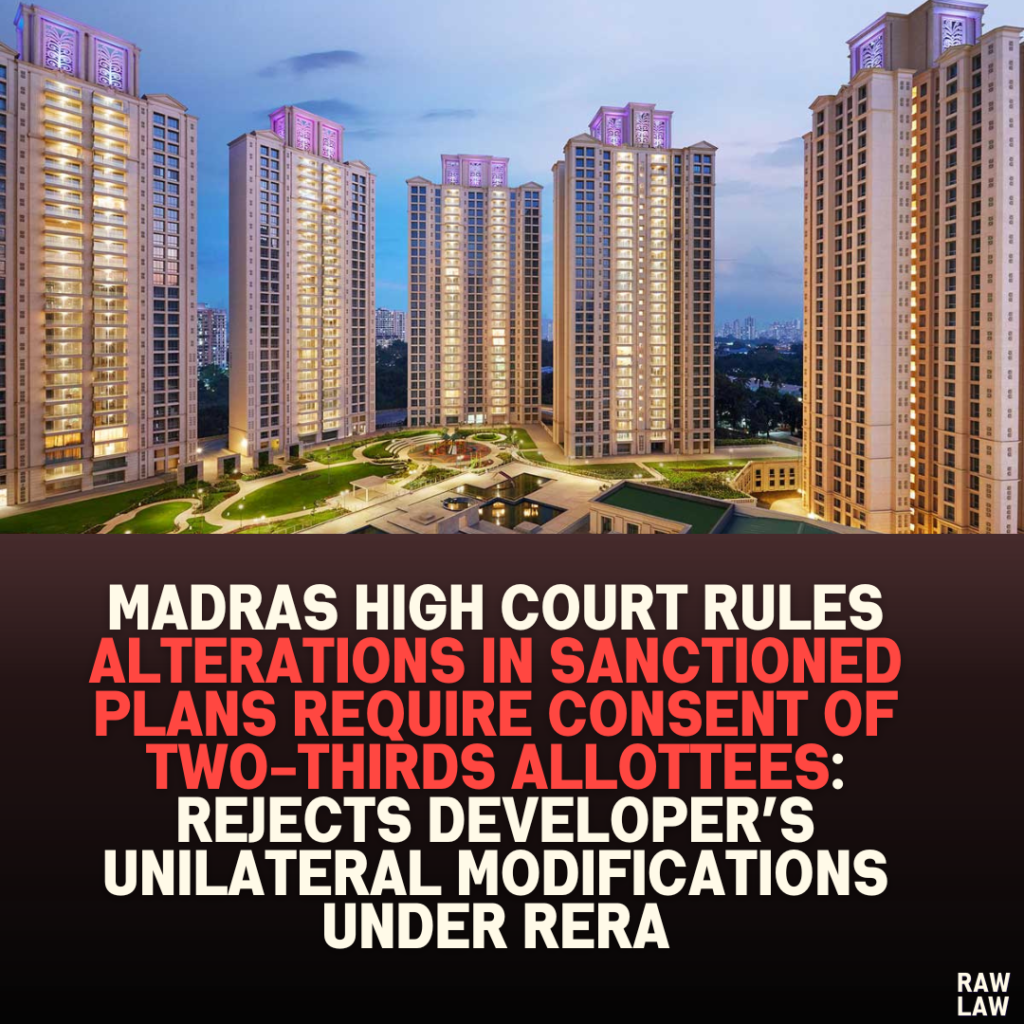Court’s Decision:
The Madras High Court allowed the appeal in part, holding that changes to the original sanctioned plan by the third respondent (Hiranandani Developers) violated Section 14(2) of the Real Estate (Regulation and Development) Act, 2016 (RERA Act). It ruled that alterations or modifications in the sanctioned plans require the written consent of at least two-thirds of the allottees and cannot be unilaterally executed by the promoter.
Facts of the Case:
- Background of the Project: The third respondent, Hiranandani Developers, obtained approvals for a gated community project, “House of Hiranandani,” at Egattur, Chennai. The project, spanning 120 acres, included residential towers and common amenities like clubhouses for each phase.
- Alleged Violation: The appellant, Chennai Hiranandani Residents Welfare Association, argued that the approved amenities, particularly the clubhouse for Phase II, were replaced by two residential towers, Octavius and Verona, violating the original plan.
- Approval Timeline: Revised approvals were granted by the Directorate of Town and Country Planning (DTCP) in 2020 without consulting the existing residents or securing their consent.
Issues:
- Whether the revised planning approvals comply with Section 14(2) of the RERA Act.
- Whether the developer can unilaterally modify the sanctioned plan without the consent of two-thirds of the allottees.
- Whether the clubhouse qualifies as a “common area” under RERA.
Petitioner’s Arguments:
- The original sanctioned plan, which formed the basis of the residents’ investment, was altered without their consent.
- The clubhouse, a promised amenity, was replaced by residential towers, reducing the value and utility of the project for residents.
- The revised plan violates Section 14(2)(ii) of the RERA Act, which mandates two-thirds consent for modifications.
Respondent’s Arguments:
- The project was conceptualized in phases, and the revisions were limited to unutilized land owned by the promoter.
- The developer argued that the revised plan complied with Tamil Nadu Real Estate Rules, which exempt projects sanctioned before RERA’s enactment from obtaining consent for subsequent phases.
- It contended that the revised plan provided an alternative clubhouse facility, fulfilling the initial commitments.
Analysis of the Law:
- Section 14 of the RERA Act: The court emphasized that this provision imposes a clear embargo on unilateral alterations to sanctioned plans affecting common areas, without two-thirds of the allottees’ consent.
- Common Area Definition: The court held that the clubhouse qualifies as a “common area” under RERA, as it was marketed as part of the project’s amenities.
- Applicability of Tamil Nadu Rules: The court rejected the respondent’s reliance on Rule 4 of the Tamil Nadu Real Estate (Regulation and Development) Rules, 2017, stating that the exemption applies only to phases approved before RERA’s enforcement.
Precedent Analysis:
The court referenced relevant judgments, including:
- Newtech Promoters and Developers Pvt. Ltd. vs. State of U.P., emphasizing transparency and consumer protection under RERA.
- Abbotsbury Owners’ Association vs. CMDA, where developers were barred from altering common areas without consent.
Court’s Reasoning:
- The court criticized the developer for deviating from the original plan that formed the basis of the residents’ investments.
- It highlighted the importance of protecting homebuyers’ rights under RERA and ensuring adherence to promises made during the sale process.
- The court found that the developer failed to obtain the requisite consent for the revisions, violating both RERA and the residents’ legitimate expectations.
Conclusion:
The court set aside the revised approvals for the new towers (Octavius and Verona) and directed the developer to adhere to the original sanctioned plan. It emphasized the need for transparency and accountability in real estate projects, aligning with the objectives of RERA.



